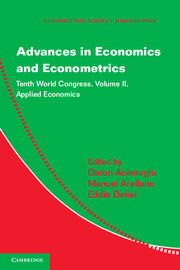Book contents
- Frontmatter
- Contents
- Contributors
- Preface
- I FINANCE
- II POLITICAL ECONOMY
- 2 Institutional Comparative Statics
- 3 The Political Economy of Mass Media
- 4 Comments on Prat and Strömberg, and Robinson and Torvik
- III MACROECONOMICS
- IV TRADE AND FIRM DYNAMICS
- V GROWTH
- VI FRISCH LECTURE
- VII PERSPECTIVES ON CHINESE ECONOMIC GROWTH
- Name Index
- Miscellaneous Endmatter
4 - Comments on Prat and Strömberg, and Robinson and Torvik
Published online by Cambridge University Press: 05 May 2013
- Frontmatter
- Contents
- Contributors
- Preface
- I FINANCE
- II POLITICAL ECONOMY
- 2 Institutional Comparative Statics
- 3 The Political Economy of Mass Media
- 4 Comments on Prat and Strömberg, and Robinson and Torvik
- III MACROECONOMICS
- IV TRADE AND FIRM DYNAMICS
- V GROWTH
- VI FRISCH LECTURE
- VII PERSPECTIVES ON CHINESE ECONOMIC GROWTH
- Name Index
- Miscellaneous Endmatter
Summary
This session of the 2010 Econometric Society World Congress is an opportunity to look at the state of the field of political economy. The two papers presented are quite different in terms of purpose and style, but they are representative of two of the most exciting ideas developed in the field in this decade. The paper by Andrea Prat and David Strömberg provides an overview of the literature on the political economy of mass media: that is, the study of how mass media affects political outcomes and economic allocations and how the political system and the economy determine the structure of mass media. The paper by James Robinson and Ragnar Torvik presents a new theoretical attempt to explain why the ability of societies to adapt to changing environments depends on the quality of their institutions. The study of mass media and political institutions is not new to political economy. In the last 10 years, however, we have seen a renewed interest in these issues. New questions have been asked and, perhaps even more important, new techniques have been introduced to answer them. For this reason, these papers are illuminating not only on the specific topics that they develop but also for what they tell us about how political economy in general is changing.
- Type
- Chapter
- Information
- Advances in Economics and EconometricsTenth World Congress, pp. 188 - 194Publisher: Cambridge University PressPrint publication year: 2013
- 1
- Cited by

